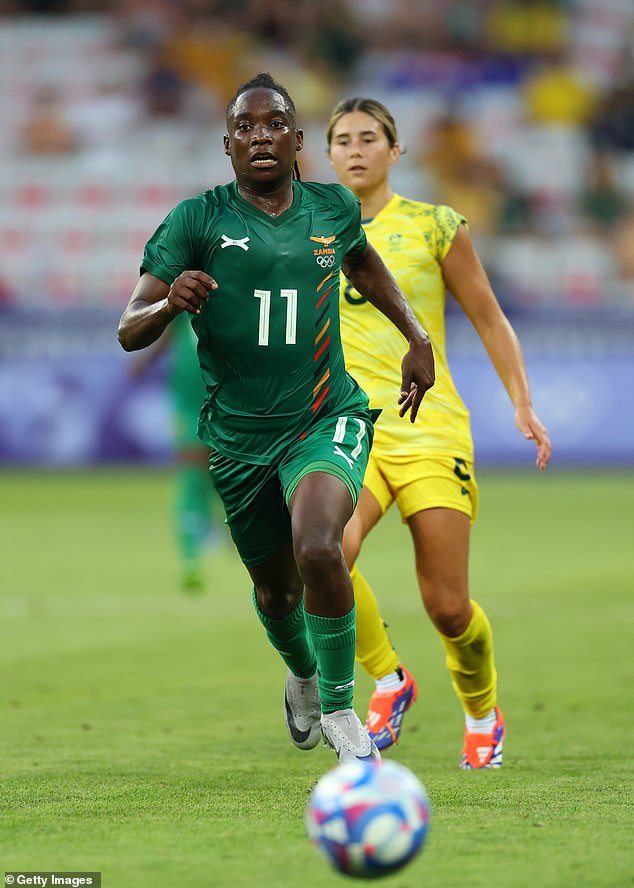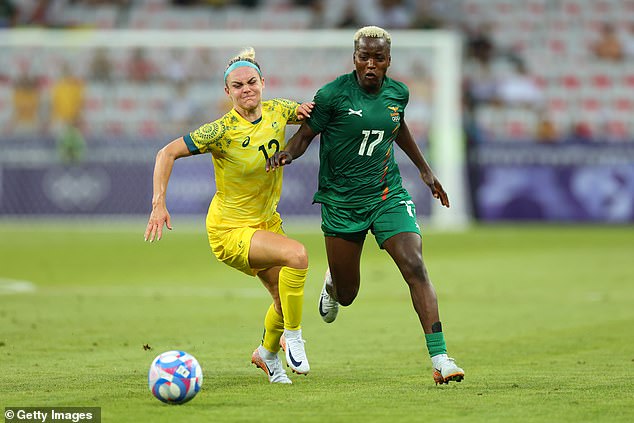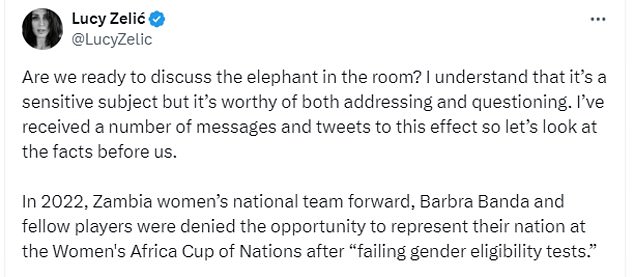- A commentator attacked two Zambian footballers
- Barbra Banda and Racheal Kundananji scored against the Australians
- Zelic said both players failed gender tests and were suspended.
Australian soccer commentator Lucy Zelic has criticised the International Olympic Committee for allowing two Zambian women’s soccer stars to play in Paris after claiming they had previously been banned from the field for failing gender tests.
Barbra Banda scored a hat-trick and Racheal Kundananji found the back of the net twice as the African side gave Australia the scare of their lives before the Matildas won their pool clash 6-5 on Monday.
In July 2022, Banda was banned from the Women’s Africa Cup of Nations (WAFCON) competition after reportedly failing a gender eligibility test that put her in breach of rules set by football’s world governing body FIFA.
She had been allowed to participate in the Tokyo Olympics the previous year.
Kundananji was also reported to have been expelled from WAFCON because her levels of the hormone testosterone were above those permitted by the Confederation of African Football (CAF).
However the Telegraph The newspaper investigated and discovered that both players were excluded from the tournament after refusing to take hormone suppression treatments when their testosterone levels exceeded what was permitted by CAF.
The publication reported that the players never took gender eligibility tests.
Zelic described the scandal surrounding Banda and Kundananji as “the elephant in the room” in a social media post on Tuesday morning.
Lucy Zelic has called the fact that two Zambian football stars have been allowed to play at the Paris Games “the elephant in the room” after claiming they both failed gender tests.

Barbra Banda (pictured) scored a hat-trick against the Matildas after being banned from playing in a tournament in Africa for allegedly having too much testosterone to pass a gender check.

Zambia’s Racheal Kundananji (pictured) scored twice against Australia. She was reported to be in the same position as Banda when it came time for the Test.
“In 2022, Zambia women’s national team forward Barbra Banda and her teammates were denied the chance to represent their nation at the Africa Women’s Cup of Nations after ‘failing to pass gender eligibility tests,'” Zelic wrote.
‘Apart from Banda, ‘three teammates, including striker Racheal Kundananji, have also been declared ineligible to compete for Zambia in the World Cup qualifying tournament.’
‘However, in 2023, these players were allowed to play in the Women’s World Cup because FIFA allowed teams to “undergo their own internal gender assessments.”
“We have the right to ask questions. We have the right to know why the failed gender verification tests carried out in 2022 were completely ignored by FIFA in 2023 and continue to be ignored in 2024.”
Zelic was joined in his outrage by former Liberal Party candidate Katherine Deves, who said X went much further than the football pundit but provided no evidence to back up a shocking claim.

Pictured: The tweet in which Zelic claimed that players were banned for “failing to pass gender eligibility tests”

Former Liberal Party Senate candidate Katherine Deves (pictured) claimed Banda is male but provided no evidence. Banda was identified as female at birth
“Australian Matildas beat Zambia 6-5 at #Paris2024. Barbara (sic) Banda is Zambia’s ‘star’ player. Mainstream media won’t tell you Banda is a man,” Deves wrote.
Banda was identified as female at birth.
According to the International Olympic Committee’s 2021 guidelines on gender identity and sex variations, the organization aims to ensure that “athletes are not excluded solely on the basis of their transgender identity or sex variations” while striving to create an environment where “no participant has an unfair and disproportionate advantage over others.”
FIFA’s rules on trans athletes state that participating member associations, such as CAF or Football Australia, must “prior to nomination to the national team, ensure the correct gender of all players to be considered… actively investigating any perceived deviation in secondary sex characteristics.”


